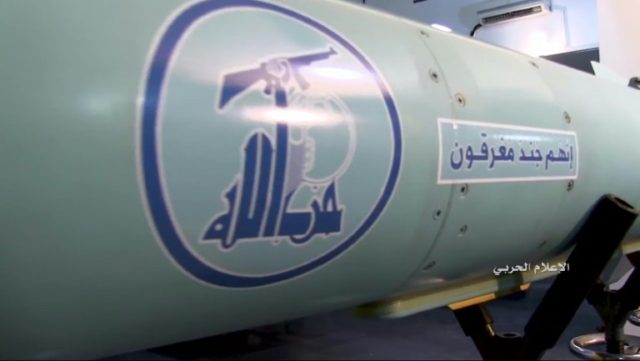Beirut (AFP) – Hezbollah released footage of what it says are anti-ship missiles of the kind it used 13 years ago against Israel before marking on Friday its self-declared “victory” in the 2006 war.
Israel has fought several conflicts against the Iran-backed Hezbollah, the last in 2006.
More than 1,200 Lebanese, mostly civilians, and more than 160 Israelis, the majority soldiers, died during the last conflict but many in Israel consider the war a failure as Hezbollah was not defeated.
Since 2006, Israeli officials have repeatedly warned that the Shiite group maintains an arsenal of several hundred long-range missiles that could be used to target Israel.
On Thursday night, a series of videos on Hezbollah-run media purported to show at least five anti-ship missiles stored inside metallic containers in an unknown location.
Hezbollah’s logo could be seen printed on the warheads.
It was not clear when the footage was filmed.
A Hezbollah naval commander, identified as Haj Jalal, told Hezbollah’s Al-Manar TV on Thursday that the anti-ship missiles are of the same kind used in a 2006 attack on one of the Israeli navy’s top warships, the INS Hanit.
The warship was struck off the coast of Beirut in July 2006, killing four soldiers and causing extensive damage to the corvette.
It was the first direct strike on an Israeli warship in decades and Hezbollah celebrated it as among its biggest victories of the 34-day war.
An investigation found that the missile hit because officials did not believe Hezbollah had such sophisticated technology and so didn’t turn on anti-missile systems.
On Thursday, Hezbollah released what it said are videos of the 2006 missile attack.
One clip purported to show men dressed in Hezbollah uniform tracking the Israeli warship using a radar.
It also purported to show a truck-mounted launcher firing two anti-ship missiles, that were filmed streaking through the night sky.
Shortly after, the video shows a distant blaze.
In the years since the 2006 war, the discovery of offshore gas fields in Israeli waters has prompted investment in new warships to protect non-moving gas platforms.
Haj Jalal on Thursday told Al-Manar that an anti-ship arsenal is significant to Hezbollah because the “sea serves as an economic lung for the Zionist enemy.”
He mentioned “offshore gas fields, some of which are still being explored.”
“A threat at sea is a threat to Israel’s national security,” said Haj Jalal, whose face was blurred during the interview, a common security measure by the Shiite group.
On Friday, Hezbollah chief Hassan Nasrallah gave a televised speech as the movement marked the anniversary of what it called its military “victory” in Bint Jbeil in southern Lebanon near the Israeli border.
He said that the 2006 war has helped Hezbollah develop “a military system to defend our villages, towns and cities.”
“If (Israel) enters southern Lebanon… you will see a live broadcast of the destruction of Israeli brigades,” he warned.

COMMENTS
Please let us know if you're having issues with commenting.